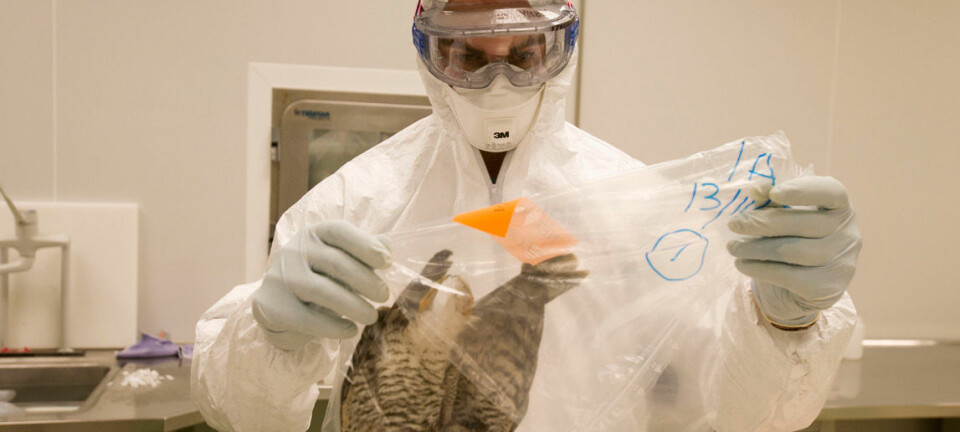
How much should you drink when you're sick?
Not all infections necessitate a greater intake of fluids than usual.
Respiratory infections generally strike in the winter half of the year. Stomach and intestinal infections, for instance the norovirus, also peak in winter but can occur any time of the year.
Doctors often remind us to drink extra fluids when sick, but this is not always necessary.
In 2011 researchers summed up relevant research on the effect of drinking extra amongst patients with acute respiratory infections.
They concluded that there was no scientific basis for either advising or cautioning against intakes of extra fluids when you have a cough and a sore and mucous congested throat.
“With infections that don’t entail much loss of fluids or sweating there is no automatic need to drink extra,” says the MD and professor of family medicine at the University of Bergen, Gunnar T. Bondevik.
“Examples are respiratory infections and ear infections without fevers.”
Fever is a key word in this respect.
How much extra liquid?
Bondevik says you should drink more liquids than normal if you have a fever or infections that trigger a loss of body fluids, such as vomiting or diarrhoea. Fevers make us sweat and a refill of liquids helps the body maintain the right balance of fluids.
The Norwegian Institute of Public Health (FHI) reminds us that we need to drink plenty when we have the norovirus – gastric flu.
But how much more than usual should we drink when we get a fever or gastric flu?
Bondevik says that for adults who can take care of themselves it suffices to drink one extra glass of liquid each time they drink.
This is a good rule of thumb, even though our normal individual intakes of liquids vary.
A common recommendation is 1.5 to 2 litres per day for an adult, according to the website Norsk Helseinformatikk. This amount includes the liquids we get from eating.
The feeble and children
Bondevik stresses that this does not apply to persons who are acutely ill, in a nursing home or hospitalised. These patients need special attention and might need more exact amounts of liquids.
Children are also more vulnerable than healthy adults and it is thus more important to ensure their intake balances with their loss of fluids.
Doctors should give specific advice to guardians or parents when kids are suffering from an illness entailing fluid losses, explains Bondevik.
“Children cannot tolerate as much as adults. If they are vomiting or have diarrhoea we need to be concrete about the quantities and types of liquids they are given.”
“Adults without chronic ailments will usually manage fine. So we needn’t be specific with these patients. But the elderly and the sickly will need an extra reminder about concrete amounts of fluids they should be getting,” says the professor of family medicine.
Not just plain water for the child
Children need to drink more to retain their balance of fluids if they are vomiting and have diarrhoea or a fever. Bondevik says it is important for parents to give them more than just plain water.
“If we only drink pure water we are not getting enough electrolytes – in other words, enough salts.”
“Instead, the children can have various mixes of apple juice and water, or soft drinks and water. Or parents can buy products at the pharmacy which have the right levels of salts,” he says.
A common remedy in Norway is a glucose-electrolyte powder called “Gem”.
“Gem can be of help if you suspect the child is losing fluids, for instance if it has thrown up or had diarrhoea several times a day,” says Bondevik.
With children another factor is whether they are eating. They get liquids through food too.
Bondevik says in general if the child eats well and does not have a fever or gastric flu it does not need to drink extra liquids.
Rotavirus
Another cause of vomiting and diarrhoea is rotavirus. This can be a tough bug for children and infants, and they have been offered a vaccine against it since the autumn 2014 as part of the Child Immunisation in Norway.
In some cases parental care in the form of sufficient liquids at home is not enough. Before the vaccine was made available, the virus was responsible for the hospitalisation of 700 to 1,100 children under the age of five in Norway annually, according to the Norwegian Institute of Public Health (FHI).
These kids were treated against dehydration. Acute symptoms of dehydration include listlessness and apathy and that the suffering child cannot drink.
The World Health Organization informs that about 215,000 children under five years of age die every year from rotavirus infections. This fatal outcome has also on rare occasions occurred in Norway too, according to FHI’s website, fhi.no.
Urinary tract infections
A urinary tract infection does not lead to a loss of fluids. Yet doctors often prescribe drinking plenty of liquids to help dilute the bacteria flora.
“Many women get this and treat it initially themselves. They know the symptoms, drink a little more than usual, and can often get some relief,” says Gunnar Bondevik.
But it is possible to drink too much. A case where a woman with a urinary tract infection became acutely ill from overdoing her intake of liquids was recently described in the British Medical Journal.
Symptoms of water intoxication or hyponatremia – insufficient salts in the bloodstream caused by drinking too much liquid – can include confusion, or a dazed state and feeling unwell. This is not just a feeling; the sufferer can die.
“But this is nothing we should go around and worry about,” asserts Bondevik. “Dehydration is a much more frequent problem.”
--------------------------------------
Read the Norwegian version of this article at forskning.no
Translated by: Glenn Ostling
Scientific links
- M.P. B. Guppy et al.: Advising patients to increase fluid intake for treating acute respiratory infections. Cochrane Database Syst Rev, 2011.
- M.P. B. Guppy et al.: Advising patients to increase fluid intake for treating acute respiratory infections. Cochrane Database Syst Rev, 2011.
- S.B Freedman et al.: Effect of Dilute Apple Juice and Preferred Fluids vs Electrolyte Maintenance Solution on Treatment Failure Among Children With Mild Gastroenteritis: A Randomized Clinical Trial. JAMA, May 2016
































